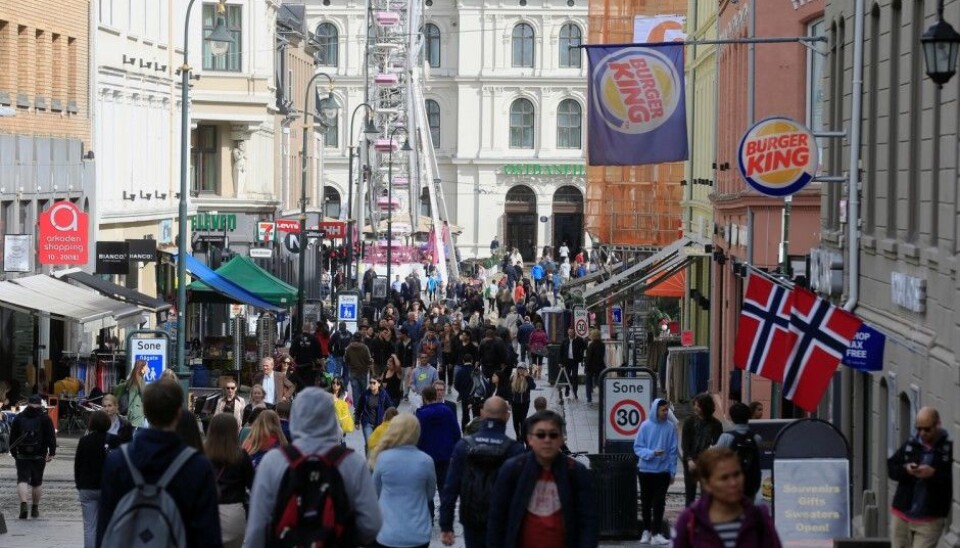An article from University of Oslo

Is our sense of community weakened by increased immigration?
Does increased immigration make us less willing to contribute to the common good? And if so, can personal contact and friendship remedy this reluctance? To find the answer, economists have studied room mates in the military.
Social scientists have been busy mapping what effect a growing ethnic diversity has on welfare states. Some believe that increased immigration contributes to innovation, creativity and economic growth. Others have worried that a more heterogeneous population will lead to less social trust, less unity and more tension among its citizens. Among these is the political scientist Robert Putnam. He has found that increased ethnic diversity in the American society leads to less trust both within and between ethnic groups, something which in turn affects the sense of community.
“Although American research shows that people who live in areas of high ethnic diversity are less willing to contribute to the collective good, we cannot know for sure if the two factors are causally connected. That is to say, whether it is in fact ethnic heterogeneity that leads to a reduced sense of community”, says Gaute Torsvik, Professor at the Department of Economics, and the new leader of the research centre Oslo Fiscal Studies (OFS).
“Perhaps there are other factors that lie behind such a context”, according to Torsvik. He goes on to explain that areas with a lot of immigration for instance may be characterised by poverty, which in itself can reduce the will or ability to contribute to a collective good.
Willing to pay
Torsvik underlines that the legitimacy of the welfare state depends on inhabitants who are willing to pay taxes and who support a redistribution of income. It is his opinion that if researchers like Putnam are right in their conclusions it is important to develop political measures that can deter dynamics such as these.
“Imagine the welfare state is like a large insurance system and that the willingness to contribute to this system is dependent to a certain degree on whether you believe that others are contributing the same as you. In which case, immigration may lead to more "Us versus Them" thinking, less trust, and less support for the welfare state”, Torsvik explains.
Developing on these questions, he has just completed a research project together with colleagues where they study room mates in the Norwegian army. The goal of the project was to find out whether close interaction between different ethnic groups contribute to build trust between them. If the answer is yes, it gives us a more positive picture of how immigration influences social trust in western societies compared to the conclusions of previous American studies. The results can take the researchers a step closer in finding answers about how increased immigration might also influence our tax morale.
Boot camp a good case study
The study was carried out in the autumn of 2015 in cooperation with the Norwegian Armed Forces and the army’s Brigade North. Everyone undertaking first time service must go through an 8 week long and demanding training camp.
The soldiers are divided into different camps, all in remote locations, and work for approximately 12 - 15 hours a day. This gives them little possibility for socialising with anyone other than their room mates. Such a close and small environment was therefore ideal for investigating whether the close relationship between the soldiers might have a positive effect on their levels of social trust.
“The soldiers were placed in rooms together completely randomly. We wanted to see how being exposed to a situation of close interaction such as sharing a room in the armed forces can influence social trust in immigrants”, Torsvik explains.
More specifically the researchers wanted to find answers to whether the soldiers sharing a room with soldiers of an immigrant background were more trusting after the stay compared to before the boot camp started.
This was tested using a so-called trust game: an experiment where the players must trust each other in order to increase their own, real monetary gains. The researchers wanted to see if the soldiers’ degree of trust changed if their fictional partner had an immigrant background.
Disproved own prejudices
Results from the study substantiated Torsvik and the research group’s hypothesis that close contact with individuals with an immigrant background increases trust to minority groups. They found that the soldiers who had shared a room with a soldier with an immigrant background appeared to trust ethnic minority groups more than the other soldiers who had also been participating in the trust games.
According to previous research on how interaction can prevent conflicts, the reason for this might be that the soldiers disproved their own prejudices and misconceptions of immigrants during their time in the boot camp.
“We found that soldiers from municipalities with a large proportion of immigrants were in particular more trusting towards immigrants when they had shared a room with a soldier of immigrant background”, says Torsvik. He does not rule out that the research finding might reflect that municipalities with a high proportion of non-western immigrants, such as Oslo, often are more segregated than other municipalities.
Sows doubt about the term “Swedish conditions”
According to Gaute Torsvik, the research centre Oslo Fiscal Studies has an important role to play in bringing forward important knowledge about taxation questions that often are the subject of heated political discussions. As the leader of the centre, Torsvik wants it to be a catalyst for good, solid research.
“We need a critical eye to what works and does not work, and what we can know and not know”, says the economist.
He emphasises that the effect of immigration on our welfare society is a highly relevant and politically inflamed example. The term "Swedish conditions" has been batted about in media of late and has been used to describe an increase in crimes due to a high amount of immigration and low integration.
“Many claim there are more criminal acts and conflicts in Sweden due to the increase in immigration, but there are no good studies that can confirm that this in fact is the case. Research on how immigration influences our tax morale is also lacking. This is where we can assist with analysis”, he says.
































